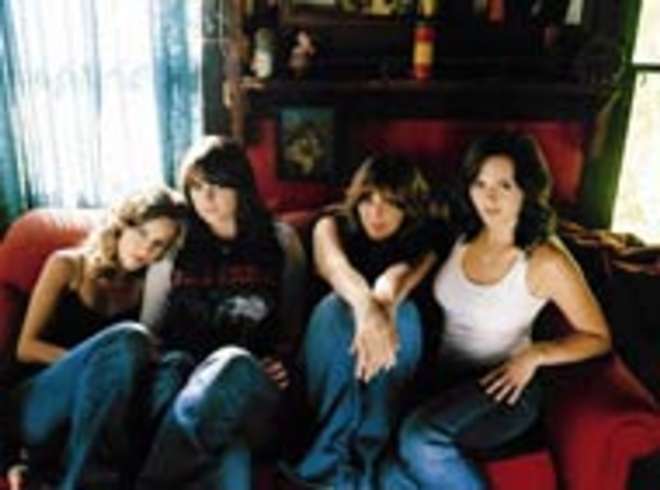
I happen to think I'm The Donnas' good-luck charm.
Every time the Palo Alto, Calif., all-girl foursome puts out a new album of spunky, simple, bratty rock 'n' roll, I listen, and I like, and I think, "well, that's the last we'll hear of them." I assume that the band has cruised as far as it can on the woefully off-the-mark perception that it's all a shtick, that the novelty will have worn off for those attracted by it and nothing else, that The Donnas will hereafter be consigned to doing their thing - and doing it well - in post-heyday obscurity.
And every time, The Donnas get bigger.
It's baseless and delusional to think that these young ladies' consistently rising profile is somehow directly related to my consistent cynicism regarding their mainstream prospects, but I like to think it anyway. In my heart of hearts, I know that their continued good fortune depends entirely on my shitty attitude.
Bassist Maya "Donna F" Ford, naturally, doesn't see it that way.
"I think we're always getting new fans," she says. "When people see us on [clip shows on] VH-1, they're like, 'who's that?' They get interested. I also think our new album is different from the old albums. It's more friendly to the ear, more melodic. It reaches out to more people."
Ford has a point, at that. Released in October, Gold Medal - The Donnas' second full-length album on major label Atlantic Records, and sixth overall - largely eschews the quartet's trademark four-chord, four-on-the-floor, almost-punk anthems in favor of more - more sophisticated songwriting, more diverse instrumentation (including acoustic guitar and piano), a more mature and diverse vibe.
"We just got kind of bored of our last album, and all the other stuff," says Ford. "We wanted to experiment more, do something more complex and more real, show more of ourselves emotionally. And, I play all four strings on the bass, instead of just two strings."
Gold Medal is very nearly an about-face from The Donnas' Atlantic debut, Spend The Night, a record that, albeit punched up with a big-budget sound, arguably stands as the group's most straight-up, no-holds-barred rock effort. Ford looks back on Spend The Night as a sort of sonic insurance policy against the cries of "sellout" that inevitably accompany any underground band's maiden Big Time voyage, and as a move that gave The Donnas the confidence to next undertake something as different as Gold Medal.
"When we put out our first record on Atlantic, we thought, 'everyone's going to think we're sellouts,' so we put out a kind of really fast cock-rock album," she says. "But we listened to it, and we discovered there weren't many dynamics. Albums should have peaks and valleys, be exciting and then chill out, and that's what we did with Gold Medal."
The disc has undoubtedly alienated a small percentage of longtime fans who put more stock in punk-ness than in songcraft. Ford realizes this, and reckons that it's one of the unavoidable growing pains of any act's evolution. What surprised her more about the response to Gold Medal was what she sees as Atlantic's decidedly tepid reaction to the new material.
"I don't think they're into this album at all," Ford says. "The album's out, and they're telling us there's no hits, it's not radio-friendly. I think they want us to write another [song like Spend The Night single] 'Take It Off.' It's really annoying."
Ford probably shouldn't be intimating to a music reporter that her record company isn't all that into her band's latest record. Then again, if that reporter is me, maybe she should; I'll just take it as more evidence that after this record, The Donnas will be history.
Which means The Donnas are probably going to get even bigger with the next one.
"It is hard for us not to be seen as a novelty, and I feel like female bands in general have some kind of curse, breaking up, never getting anywhere, never getting as big as the Rolling Stones," Ford muses. "We're just hoping we can break that curse, get huge, change things."

